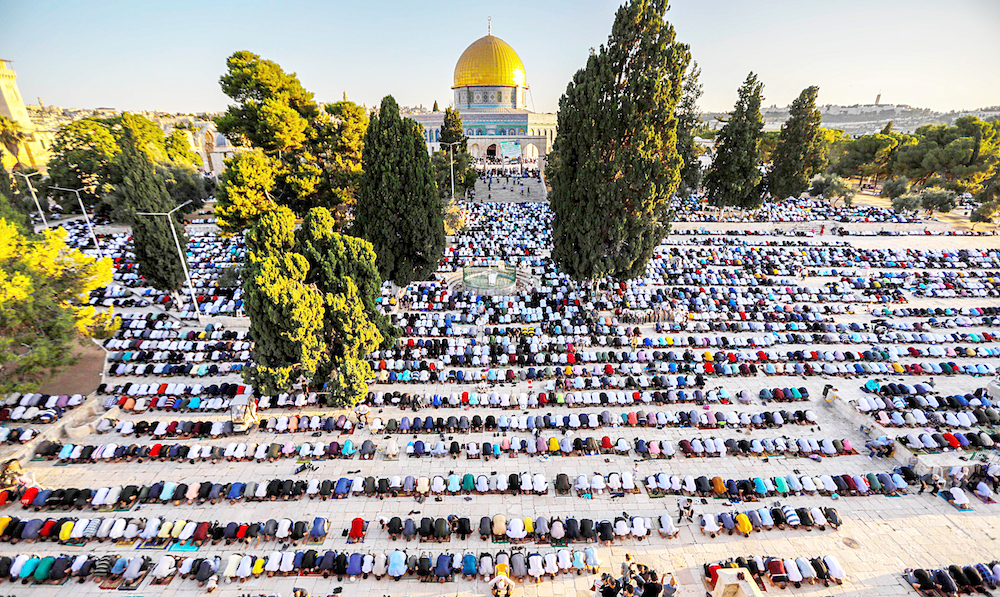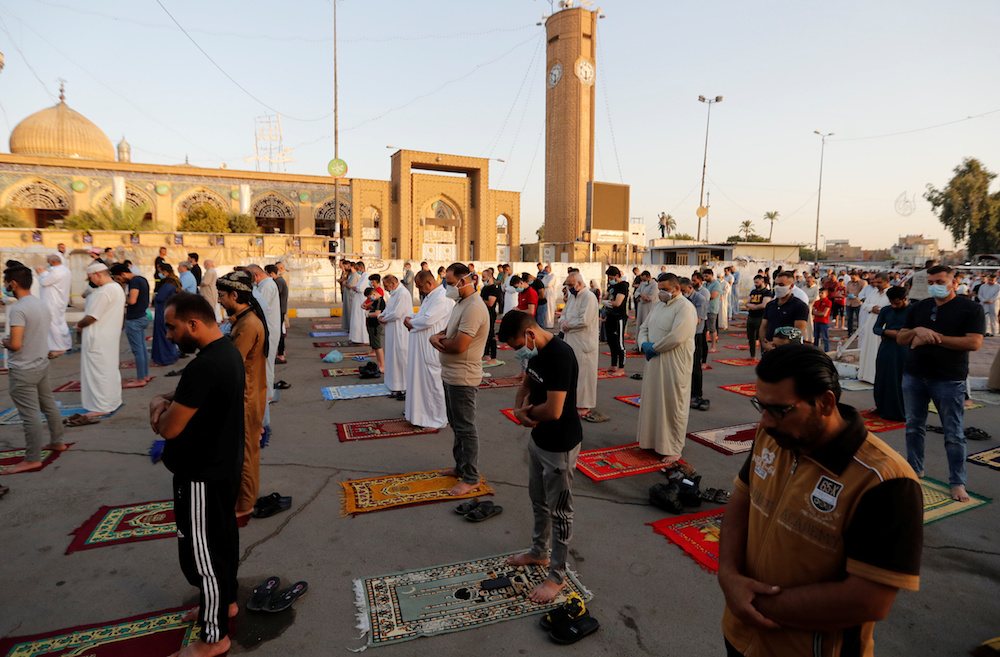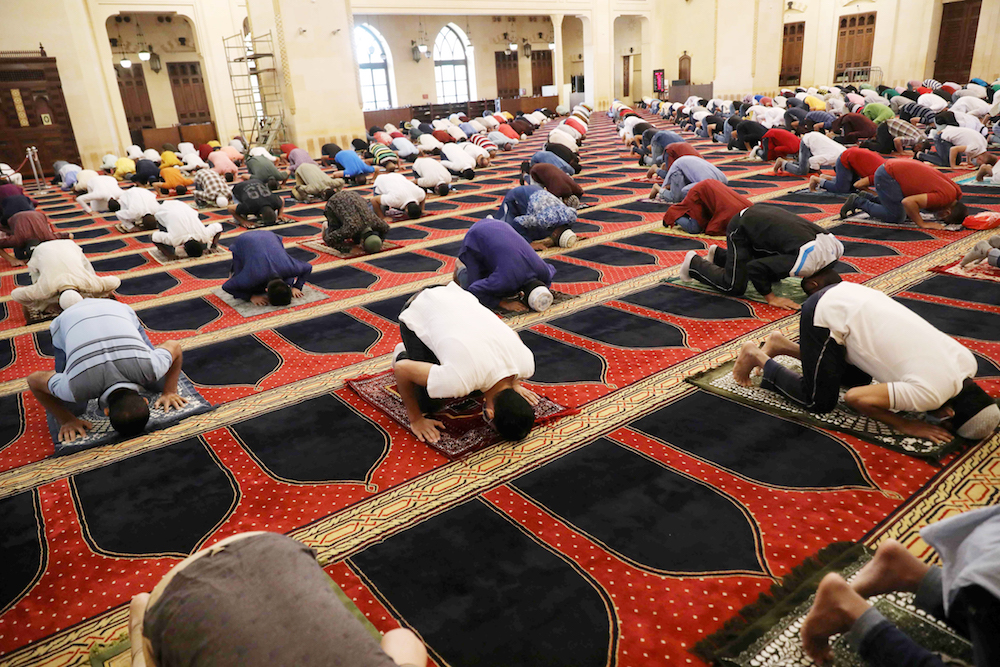JEDDAH: Muslims marked the first day of Eid Al-Adha across the world on Friday while abiding by guidelines to prevent the spread of COVID-19. In many countries, worshippers performed Eid prayers wearing face masks and observing social distancing in a bid to contain the spread of the pandemic.
In Saudi Arabia, worshippers performed prayers at designated mosques including Makkah’s Grand Mosque and the Prophet’s Mosque in Madinah. People brought their own prayers mats with them and disinfectants were available in all mosques.
COVID-19 has temporarily put a stop to several Eid traditions, including that of embracing fellow worshippers after prayers. “We offered prayers while maintaining a distance and greeted (each other) verbally,” said Zakir Khan, an Indian expatriate in Saudi Arabia.
#Muslims around the world celebrate the first day of #EidAlAdha, by performing prayers and spending time with familyhttps://t.co/YwHAQqxnXx pic.twitter.com/UwPPFc8G0C
— Arab News (@arabnews) July 31, 2020
Many Muslims have been particularly hard hit by the need to stay away from elderly relatives, who could be especially vulnerable to the virus. Rahaf Meer, 26, told Arab News that this necessity had “ruined the spirit of Eid,” explaining that her family had divided its members according to their age to avoid high-risk groups being exposed to the younger members of the family.
“My aunt arranged a gathering just for the elderly (and) my parents are attending the gathering. We weren’t invited because my grandmother is there and we can’t hug or say hello to her,” she said. “I miss her so much.”
Donna Abudawood, 23, said the atmosphere in her home, at least, is still celebratory despite the fact that the pandemic has limited family visits and prevented her from traveling to celebrate Eid with her sister, who lives overseas.
“Since the reopening of mosques in the Kingdom, we have been strictly following precautions,” Tauseef Ahmad, a health informatics analyst at King Saud University, told Arab News. “At Eid, we refrained from shaking hands and hugging, as these steps are necessary to check the spread of the virus.”
Iffat Aabroo, a housewife in Riyadh, told Arab News: “Instead of social gatherings, we connected online with family members and close friends. Hopefully things will come back to normal soon, and we can get together on big occasions.”
Aya Karim, a 17-year-old Syrian student, said: “It is sad that we cannot spend this Eid with our extended families.”
The pandemic has also forced many people to turn to the Internet to buy livestock to sacrifice instead of visiting cattle markets in person, or to simply not make a sacrifice this year. Fahad Siddique, a 31-year-old Pakistani living in Jeddah, listed several things he could not do with his family this Eid. “Because of coronavirus, people couldn’t go for Hajj, they couldn’t travel either, and I couldn’t do my sacrifice this year as I do every year,” he said.
In Jerusalem, residents came out in large numbers early on Friday morning to offer Eid prayer at Al-Aqsa Mosque. Sheikh Azzam Khatib, director of the Jerusalem Waqf Department, told Arab News that he was pleased with the turnout. “I was happy to see Jerusalemites and we tried our best to use all of Al-Aqsa Mosque and urged people to stay outdoors and to adhere to health guidelines,” he said.
Wasfi Kailani, executive director of the Hashemite Fund for the Restoration of Al-Aqsa Mosque, told Arab News that, to the Muslims of Jerusalem, this Eid was very different, taking place as it did amid COVID-19 restrictions and increased oppression by Israeli authorities, who arrested Jerusalem Governor Adnan Ghaith in July and have extended his remand until Thursday.
Palestinian Minister for Jerusalem Affairs Fadi Hidmi admitted the situation in Jerusalem was very tense, with dozens of Palestinians having been barred from entering Al-Aqsa Mosque on religious occasions including Eid Al-Adha.
#PHOTOS: #EidAlAdha is celebrated by #Muslims across the world, from Palestine to Morocco and from the UK to Russia and beyond...https://t.co/GnQWRpebHG pic.twitter.com/BsmKXcEnQN
— Arab News (@arabnews) July 31, 2020
Jordan and the Arab League issued strong statements against Israel for protecting extremist infiltrators violating the sanctity of Al-Aqsa Mosque.
Sheikh Mohammad Hussein, the mufti of Jerusalem and the Palestinian areas, gave a 14-minute sermon on Friday stressing the right of Muslims to worship in the mosque, and the need for unity among Palestinians.
“The blessed Al-Aqsa Mosque is a place of worship for Muslims,” he said. “We call for Palestinian unity as the only option to stand up to the dangers that Jerusalem and its holy sites are facing.”
In Jordan, restrictions were comparatively relaxed thanks to the country’s low rate of COVID-19 cases. In the month leading up to Eid Al-Adha, less than a dozen local infections were reported.
Health Minister Saad Jaber encouraged Jordanians to enjoy the holidays so long as they abided by government guidelines, while Imad Hijazin, director-general of the Ministry of Tourism, told Arab News: “We expect a good holiday season as far as domestic tourism is concerned.”
The Ajloun Forest Reserve — run by the Royal Society for the Conservation of Nature — said that all their cabins were reserved for the holiday, while air travel between Amman and the Red Sea resort of Aqaba has reportedly increased markedly.
Eid celebrations in neighboring Lebanon, meanwhile, were overshadowed by a new two-week lockdown that has been imposed due to an alarming spike in COVID-19 cases, meaning that only a limited number of worshippers attended Eid prayers in mosques.
Thousands of Lebanese have left the cities for mountain villages to escape the summer heat and the pandemic. Hundreds have also travelled to Turkey for Eid, according to an official from Middle East Airlines.
“Turkey is the only country where passengers are not required to be quarantined for 14 days. They only need to present a medical certificate with a negative PCR test for the virus,” the official told Arab News. “And on their return to Lebanon they will not be subjected to home quarantine if their stay does not exceed a week.”
Lebanon’s Grand Mufti Sheikh Abdul Latif Derian, who usually presides over Eid prayers at Al-Amin Mosque in central Beirut, is currently overseas, so Sheikh Amin Al-Kurdi delivered a sermon on his behalf, during which he criticized those responsible for Lebanon’s economic collapse and said that anyone who desired a position of responsibility should “fear God.”
Prime Minister Hassan Diab did not attend the prayers, but sent a representative instead.
Sidon’s Grand Mufti Sheikh Salim Sussan also criticized the “widespread corruption and lack of justice” in the country in his Eid sermon at Bahaeddine Hariri Mosque, while Grand Jaafari Mufti Sheikh Ahmad Kabalan stressed the need for reconciliation between Arab and Islamic nations to ensure regional peace.
Kabalan also accused the US of “besieging and starving Lebanon,” and urged leaders to “deal with any party in the world where Lebanon’s interests are met without breaking ties with anyone.”
In the south of Lebanon, some Palestinian refugees took to the streets of Ain Al-Hilweh camp to demand the release of detainees held in Lebanese prisons.
In Egypt, a closed prayer service from Al-Sayeda Nafisa Mosque in downtown Cairo was broadcast on TV and radio and the Egyptian cabinet denied rumors that Eid prayers had been open to the public in other mosques as the country’s strict precautions against the COVID-19 pandemic remain in place. In the Minya governorate in Upper Egypt, families reportedly conducted Eid prayers on their roofs to conform with social-distancing measures.
Karim Mohamed, a Cairo-based architect and father of two, explained how his family’s Eid celebrations had been affected by COVID-19. “Even though we saw each other, we refrained from physically touching each other or sharing utensils,” he said. “The hugs and kisses usually exchanged during gatherings were replaced with air kisses.”
He added that he and his children had not taken part in the distribution of food for the needy this year either. “I decided to just donate cash,” Mohamed said.
In his Eid address, Egyptian President Abdel Fattah El-Sisi congratulated Saudi Arabia for its successful organization of the Hajj this year, “despite the exceptional circumstances.” He also congratulated the people of Egypt “and the Arab and Islamic nation on (this) blessed occasion.”
With input from:
Deema Al-Khudair, Jeddah
Ameera Abid, Jeddah
Rashid Hassan, Riyadh
Daoud Kuttab, Amman
Najia Houssari, Beirut
Mohamed Al-Shamaa, Cairo
Salma Ahmed, Cairo



from Saudi Arabia https://ift.tt/2BSkFDi





0 Comments:
Post a Comment